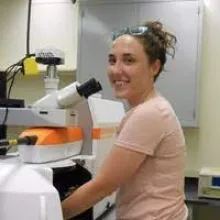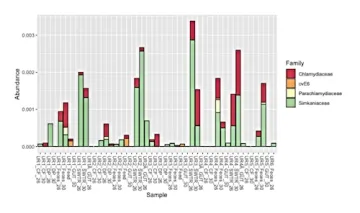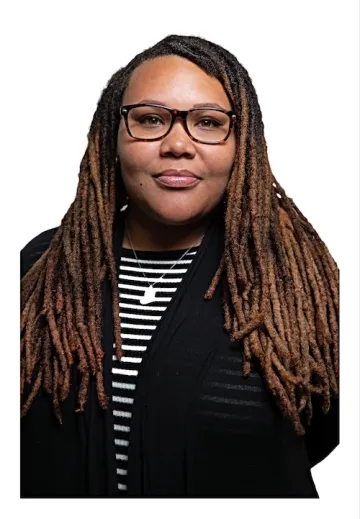A One-Stop Science Shop: Researching, Building Tutorials, and Teaching with CyVerse
Microbial ecologist Elizabeth Suter uses CyVerse as her one-stop shop for her research and teaching, customizing its existing tools to suit her needs.

Elizabeth Suter is only in her second year as an assistant professor at Molloy College in Rockville Centre, New York, and both her teaching and her research have been fully virtualized due to COVID-19. Fortunately, she was well-positioned to make the transition to online science, with her research and coursework already set up in CyVerse.
Suter has a PhD in marine and atmospheric sciences from Stony Brook University. She now studies marine microbial ecology, investigating the diversity and dynamics of microbial communities in the ocean in relation to pollution and geochemical gradients.
When quarantine measures were put into place in the spring, Suter took advantage of the opportunity to shift focus to completely computer-based science. She joined the newly formed Bioinformatics Virtual Coordination Network (BVCN), an informal group of computational biologists who apply bioinformatics tools to their work in soils and ocean sciences.
"We organized ourselves by topic," she explained. "I'm interested in teaching analysis

Elizabeth Suter
of amplicons using bioinformatics, looking at phylogenetic diversity of microbes." Amplicons are pieces of DNA or RNA that have been replicated either naturally or synthetically. Studying certain amplicons from bacteria can show the genetic relationships among organisms, and lead to revelations about environment-induced changes in how they function, including infection of hosts by microbial pathogens.
Suter, who has some past experience with cloud computing and building tutorials, decided to formalize her work with the BVCN by building a tutorial for how to analyze data with QIIME 2, an open source, community-built, online microbiome bioinformatics platform. She explored a couple of platforms, but worried they wouldn't have the bandwidth to host her large datasets.
Then she found a QIIME 2 app already built and free to use in the CyVerse Discovery Environment (DE), capable of integrating with large datasets, and she realized it would work perfectly to build her tutorial.
Suter found that CyVerse offers several options for working with QIIME 2 depending upon the user's comfort and interest in engaging with code. In addition to the DE version, there is an instance developed within CyVerse's cloud-computing platform Atmosphere, and a workflow in CyVerse's bioinformatics integration platform DNA Subway.
"I'm not a computer scientist, but I like to play with parameters, so the DE version is right at the level where I like to work," Suter said. Her QIIME 2 tutorial is available for all to use in the CyVerse DE.
Suter also teaches undergraduate environmental sciences, and enjoys opportunities to engage and mentor interested students in research. This summer she put her students to work analyzing data with the QIIME 2 tutorial in CyVerse.
An abundance plot of the microorganisms found in sea urchin samples experiencing different water temperatures. The data shows the abundance of different families of bacteria present in the samples taken from various parts of the organism, such as the coelomic fluid, feed and gut. Certain bacteria such as alphaproteobacteria, a class of proteobacteria that includes pathogenic organisms, seemed to be higher in abundance after heat stress. Image courtesy of Lenée Mason/Molloy College.

Lenée Mason was one such student. Mason, who has an associate's degree in environmental science and is majoring in adolescent science education, was looking for more research experience.
The New York State Education Department's Collegiate Science and Technology Entry Program (CSTEP) paired her with Suter for an environmental science research project. But when quarantine measures went into effect, her project was forced to take on a bioinformatics focus, since bioinformatics could be done online and remotely.
Unable to collect their own samples with fieldwork put on hold, Suter and her students mined through vast troves of publicly available data.
"The first thing I had to do was find a paper online that showed variance in marine organisms with temperature data. Certain marine organisms when in different temperatures are more susceptible to different pathogens and bacteria," Mason said. "I found a dataset about sea urchins."
"We're trying to test the hypothesis that climate change is associated with increased incidence of pathogens in shellfish and fish that serve as microbial hosts," Suter explained. "Increased temperatures are known to favor some pathogens in marine environments. Now, some fisheries are having difficulty with reproduction and it's not always clear why, so we're trying to see if there's a role of emerging pathogens across different animal hosts."
Suter helped Mason learn to code so she could convert the data she found

Lenée Mason, majoring in adolescent science education, is already teaching earth science to 10th graders.
available in the National Center for Biotechnology Information (NCBI) into QIIME 2 files in CyVerse to phylogenetically identify the microorganisms. Mason had to clean up the raw data as well, ensuring the final result would capture the parameters they wanted to investigate. She worked in R Studio to make diagrams, transforming the raw numbers into visuals that illustrated the relationships between temperature and microbial communities.
"I feel like I got to do things that most students don't get to do, especially on a teaching route," Mason said. "I got to see the other side, what happens after you do all the wet lab stuff. I learned techniques I had never considered before, like coding. I'm sure it will help me provide insight into what it's like to do online research."
Mason already has started teaching earth science to 10th-grade students remotely, and is looking forward to starting her career helping the next generation of scientists discover their passions.
And Suter is continuing with her research, teaching, and mentoring endeavors online, assisted by her own expertise, a network of collaborative scientists, and open source platforms, including CyVerse, that make virtual collaboration, data sharing, and research easy to do.

